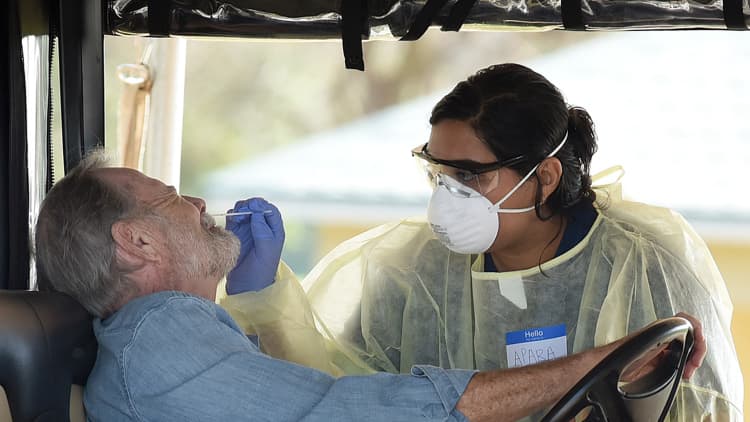Governments can't force their citizens to use technology built by Apple and Google for tracking and mitigating the spread of the Covid-19 coronavirus, senior company representatives said on Monday.
Apple and Google, normally arch-rivals, announced on Friday that they teamed up to build technology that enables public health agencies to write contact-tracing apps. The partnership is being closely watched: The two Silicon Valley giants are responsible for the two dominant mobile operating systems globally, iOS and Android, which together run almost 100% of smartphones sold, according to data from Statcounter.
Contact tracing is the practice of finding people who have been infected with a pathogen — like the Covid-19 coronavirus — and contacting people who may have been in close contact to tell them to self-isolate or take other measures, and has been recommended by experts who have seen the effectiveness of "syndromic surveillance" in tracking and slowing disease outbreaks. Around the world, governments are turning to contact-tracing apps as a tool to help businesses and schools re-open after coronavirus lockdowns. Singapore released a contact-tracing app called TraceTogether in March. England's National Health Service and several French ministries are working on their own apps.
The fact that the apps work best when a lot of people use them have raised fears that governments could force citizens to use them. But representatives from both companies insist they won't allow the technology to become mandatory.
Opt-in only
Starting in May, Google and Apple are planning to update their phone operating systems with new APIs -- application programming interfaces -- that apps can use to track what other phones have been close by using Bluetooth signals. Recognized public health agencies would then use these APIs to build digital contact tracing apps, with some development help from Google and Apple.
The way the system is envisioned, when someone tests positive for Covid-19, local public health agencies will verify the test, then use these apps to notify anybody who may have been within 10 or 15 feet of them in the past few weeks. The identity of the person who tested positive would never be revealed to the companies or to other users; their identity would be tracked using scrambled codes on phones that are unlocked only when they test positive. Only public health authorities will be allowed access these APIs, the companies said.
The two companies have drawn a line in the sand in one area: Governments will not be able to require its citizens to use contact-tracing software built with these APIs — users will have to opt-in to the system, senior representatives said on Monday.
The more people in a region who download the area's contract tracing app, the more effective it's going to be at identifying people who may have been infected. To succeed, then, the companies and public health officials will need to persuade people to trust them with their data -- which is why they are emphasizing opting-in as a key component of the software. Users who don't want to participate can stop, delete the apps and tell the software to stop tracing them, an Apple representative said.
Apple and Google said that they could shut down the system region-by-region when the pandemic slows.
The companies said they'll provide sample apps that can be treated as a starting point for a public health agencies rolling out these apps. Then, later, the companies plan to build the software directly into both Android and iOS so that downloading an app won't be necessary to start contact tracing, expanding the number of people participating in the network.
Some questions about the effort in the United States remain -- in particular, accurate testing is essential for contact tracing to work, but testing has not been widely available in the U.S. That's been an issue for Alphabet's Verily, whose testing site provides limited options for users due to low capacity of testing from health officials.
CNBC's Jennifer Elias contributed to this report.



